Key takeaways:
- Ethical advertising emphasizes honesty, transparency, and social responsibility, fostering consumer trust and loyalty.
- Consumers increasingly expect brands to commit to sustainable practices and engage in meaningful ethical conversations.
- Future trends in ethical advertising include validating claims of social responsibility and collaborative efforts between brands to address societal issues.
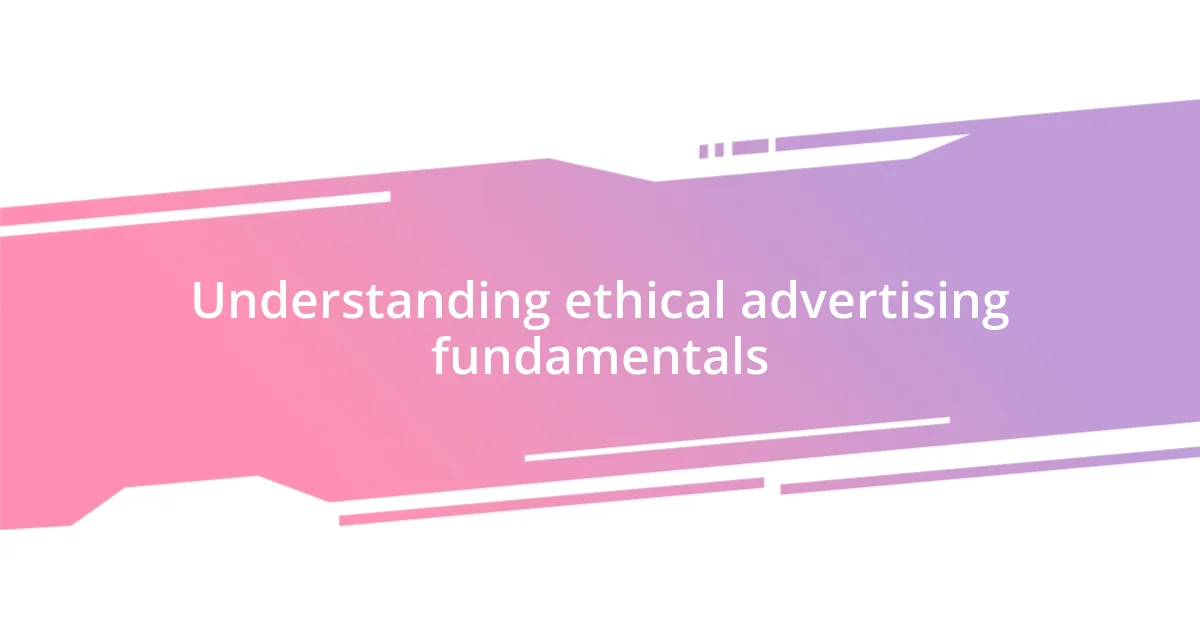
Understanding ethical advertising fundamentals
Ethical advertising is fundamentally about honesty and transparency. I’m reminded of a campaign I once encountered that proudly showcased a brand’s commitment to sustainability. This initiative resonated with me because it wasn’t just about selling a product; it articulated a vision that aligned with my values. Have you ever felt a connection like that when advertising speaks your language?
At the core, ethical advertising respects consumer autonomy by avoiding manipulative tactics. When I think about it, we’ve all seen ads that pull at our heartstrings or play into our fears. I often ask myself, “Do these strategies genuinely inform, or do they simply mislead?” It’s a vital distinction that can shape consumer trust and brand loyalty.
Moreover, understanding the importance of social responsibility in ethical advertising cannot be overstated. I once supported a brand that donated a portion of their profits to social causes, and this choice made me feel part of a larger movement. Don’t you value companies that give back and create a positive impact in the community? It’s experiences like these that highlight how advertising can be a force for good when grounded in ethical principles.
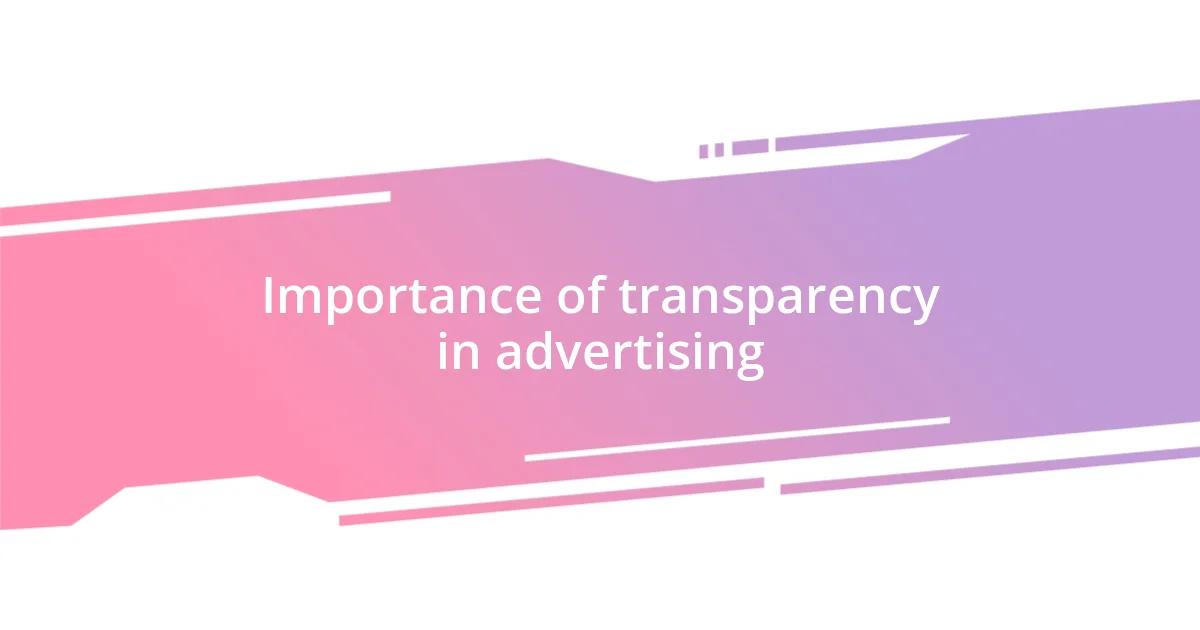
Importance of transparency in advertising
Transparency in advertising is crucial because it fosters trust between brands and consumers. I remember a time when I was drawn to a beauty brand that openly shared the ingredients in their products. Knowing what I was putting on my skin made me feel empowered. This open communication encourages consumers to make informed choices, ultimately enhancing their satisfaction and loyalty to the brand.
When companies are transparent about their advertising practices – whether it’s through clear labeling or the authenticity of testimonials – they demystify their intentions. Reflecting on my experiences, I’ve noticed that I gravitate toward businesses that don’t shy away from explaining why they’re making certain claims. It not only helps consumers understand the value being offered but also protects them from misleading information. Have you ever felt relieved to see a brand disclose its sourcing methods or advertising tactics? That small act of honesty can lead to deeper consumer relationships.
Moreover, transparent advertising practices can distinguish brands in an increasingly crowded marketplace. I recall a campaign that detailed how a coffee company sourced its beans directly from farmers at fair prices. This kind of transparency not only created a feeling of connection with the brand but also made me more likely to recommend it to friends. Just imagine how significant it is when consumers can genuinely relate to a brand’s story—it’s the kind of authenticity we need as we navigate our choices.
| Aspect | Transparent Advertising | Non-Transparent Advertising |
|---|---|---|
| Consumer Trust | High | Low |
| Informed Choices | Promotes | Hinders |
| Brand Loyalty | Increases | Decreases |
| Perceived Value | High | Low |
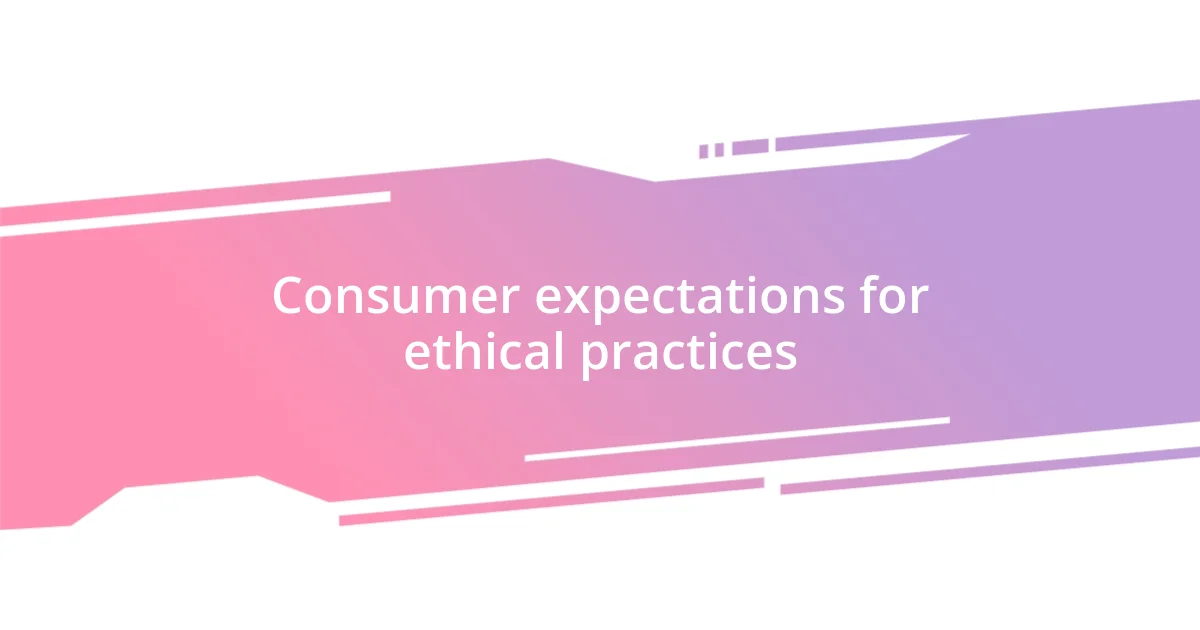
Consumer expectations for ethical practices
Consumer expectations for ethical practices have evolved significantly, and I find it fascinating how much we value authenticity and responsibility. In my experience, when brands align their practices with ethical principles, they create a sense of community. For instance, I remember purchasing from a fashion label that showcased not just their sustainable practices but also the stories of the artisans who crafted the garments. It was more than shopping; it felt like supporting a movement that championed human stories and fair labor.
As consumers, we now seek brands actively embracing social and environmental stewardship. It’s not just about the product but the ethical narrative behind it. Here’s what consumers are increasingly expecting:
- Genuine commitment to sustainable practices.
- Transparency in sourcing and manufacturing processes.
- Support for social causes, demonstrating corporate responsibility.
- Engagement in meaningful conversations about ethical issues.
- Clear and honest communication regarding product impacts and benefits.
These expectations reflect a critical shift in consumer mindset, where we are eager to connect with brands that represent our values. It’s invigorating to see how these meaningful connections can transform advertising into a powerful vehicle for positive change.
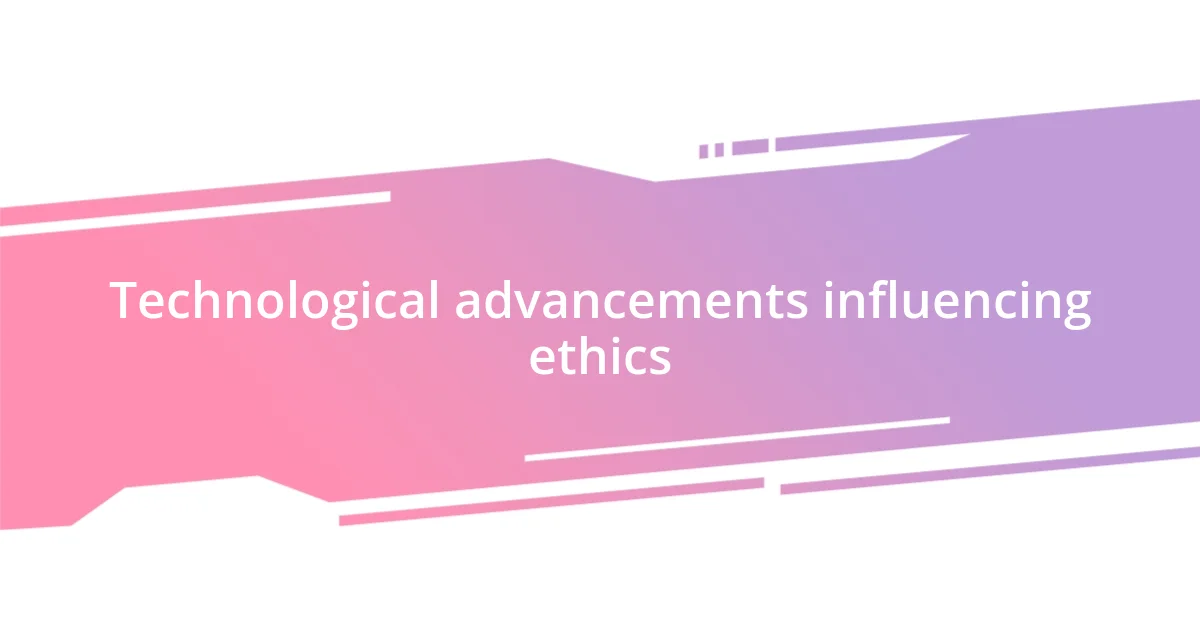
Technological advancements influencing ethics
The rise of technological advancements has profoundly reshaped the ethical landscape in advertising. Think about how data analytics now allows brands to customize their messages. I once received a targeted ad for a fitness tracker just as I was considering a healthier lifestyle. While this felt convenient, I couldn’t help but wonder—do consumers truly understand how their data is being used? The balance between personalization and privacy is tipping, which urges companies to consider their ethical responsibilities intensely.
Moreover, artificial intelligence tools are emerging as both a boon and a challenge for ethical advertising. I’ve interacted with chatbots that provide immediate responses and recommendations, but I often question their ability to represent brands authentically. For instance, if an AI is generating content, can we still guarantee that the messaging aligns with the brand’s ethical values? This evolving relationship adds a layer of complexity to trust and authenticity in advertising, compelling marketers to be more vigilant about the ethics of their technological partnerships.
As social media platforms become integral to campaigns, influencers wield significant power in shaping consumer perceptions. I remember being captivated by a post from a popular influencer advocating for a sustainable lifestyle. However, behind the scenes, there are often blurred lines regarding sponsorships. Are we truly getting an authentic experience, or just a curated advertisement dressed in authenticity? This aspect of technological influence raises questions about the genuine motivation behind promotions and urges brands to cultivate a culture of ethics, transparency, and responsibility in their partnerships.
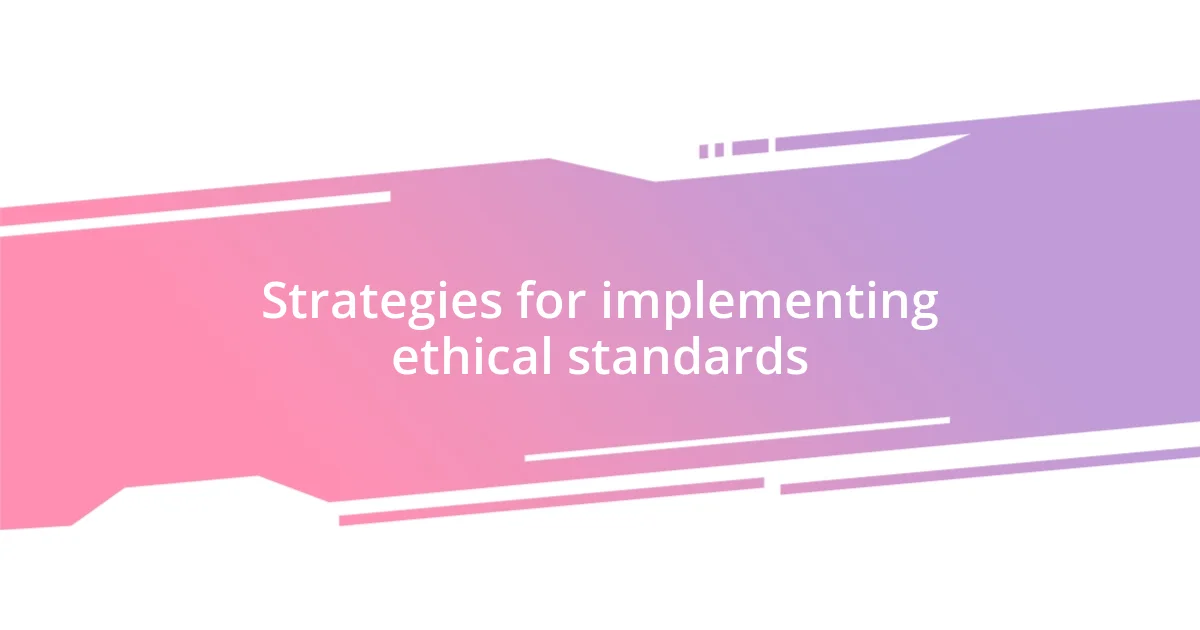
Strategies for implementing ethical standards
Adopting ethical standards in advertising requires a proactive approach that aligns with the brand’s values and consumer expectations. From my vantage point, incorporating a stakeholder approach is vital. This means involving not just the internal team, but also consumers, community members, and even industry experts in discussions around ethical practices. For instance, when my favorite coffee shop sought feedback on their sourcing practices, it made me feel valued as a customer and a part of their brand journey. They weren’t just asking for my opinion; they were genuinely committed to evolving their ethical standards based on community insights.
Another practical strategy is to develop a clear ethical framework that guides decision-making processes. I’ve seen companies benefit from creating a code of ethics that clearly outlines their commitments to transparency, sustainability, and social responsibility. Take a nonprofit organization I collaborated with, which adhered to a strict guideline on how they communicated their impact. It was inspiring to see how their commitment to honesty increased donor trust and engagement. Everyone in the organization felt more empowered to share their story, knowing it aligned with the overarching ethical narrative, reminding us all that these standards aren’t just rules—they’re part of the brand’s identity.
Finally, regular training on ethical practices is essential for all employees involved in advertising. I distinctly recall attending a workshop focused on ethical storytelling, which opened my eyes to the power of language in shaping brand perception. It struck me how vital it is for everyone on the team to understand how their individual roles contribute to the broader ethical goals. After all, if employees feel equipped and motivated to uphold ethical standards, they are more likely to foster authentic connections with consumers. So, don’t you think it’s time for brands to invest in their people, ensuring they champion the ethical values that resonate with today’s conscious consumers?
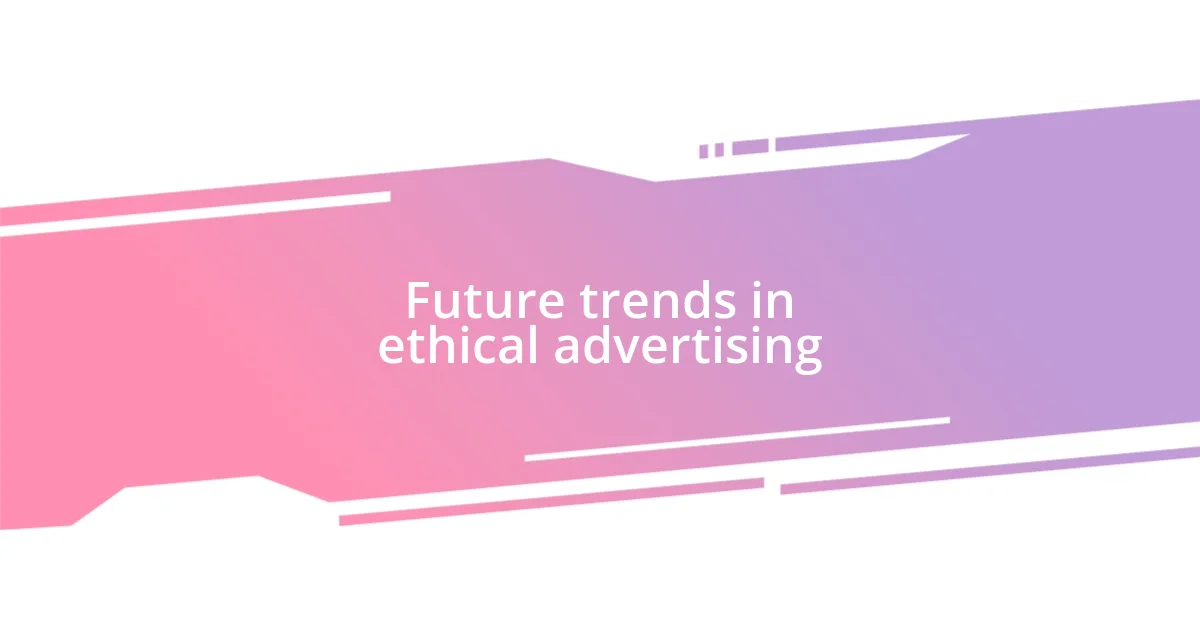
Future trends in ethical advertising
The future of ethical advertising is gaining traction as consumers become increasingly aware of brand behaviors. I vividly recall a moment when I discovered a brand that not only promoted eco-friendly products but also shared their production process transparently. It made me feel a deep connection, reminding me that consumers want authenticity, not just glossy marketing slogans. This trend suggests that brands will be pressured to not only claim ethical practices but also substantiate them. How else can they build lasting trust in an era where information is just a click away?
Another emerging trend is the incorporation of social impact metrics into advertising strategies. I remember coming across an initiative where every product purchase contributed to a meaningful cause. It struck me how these brands leveraged advertising to convey their social responsibility, creating campaigns that were not merely commercial but also purpose-driven. This shift towards communicating impact aligns with what many consumers now expect: they want their purchases to resonate with their values. Isn’t it fascinating how advertising can evolve from just selling products to facilitating change in the community?
Moreover, I foresee a rise in collaborative advertising efforts, where brands partner not just for co-branding but to tackle societal challenges together. Imagine two rival brands uniting to promote mental health awareness—I find that concept both groundbreaking and inspiring. This kind of collaboration not only enhances their ethical stances but also encapsulates the idea that brands can combine forces for a greater good. It’s a trend that indicates a departure from traditional competitive strategies and a leap towards a more community-focused approach. Will we see a new standard in advertising that prioritizes shared values over profits?












